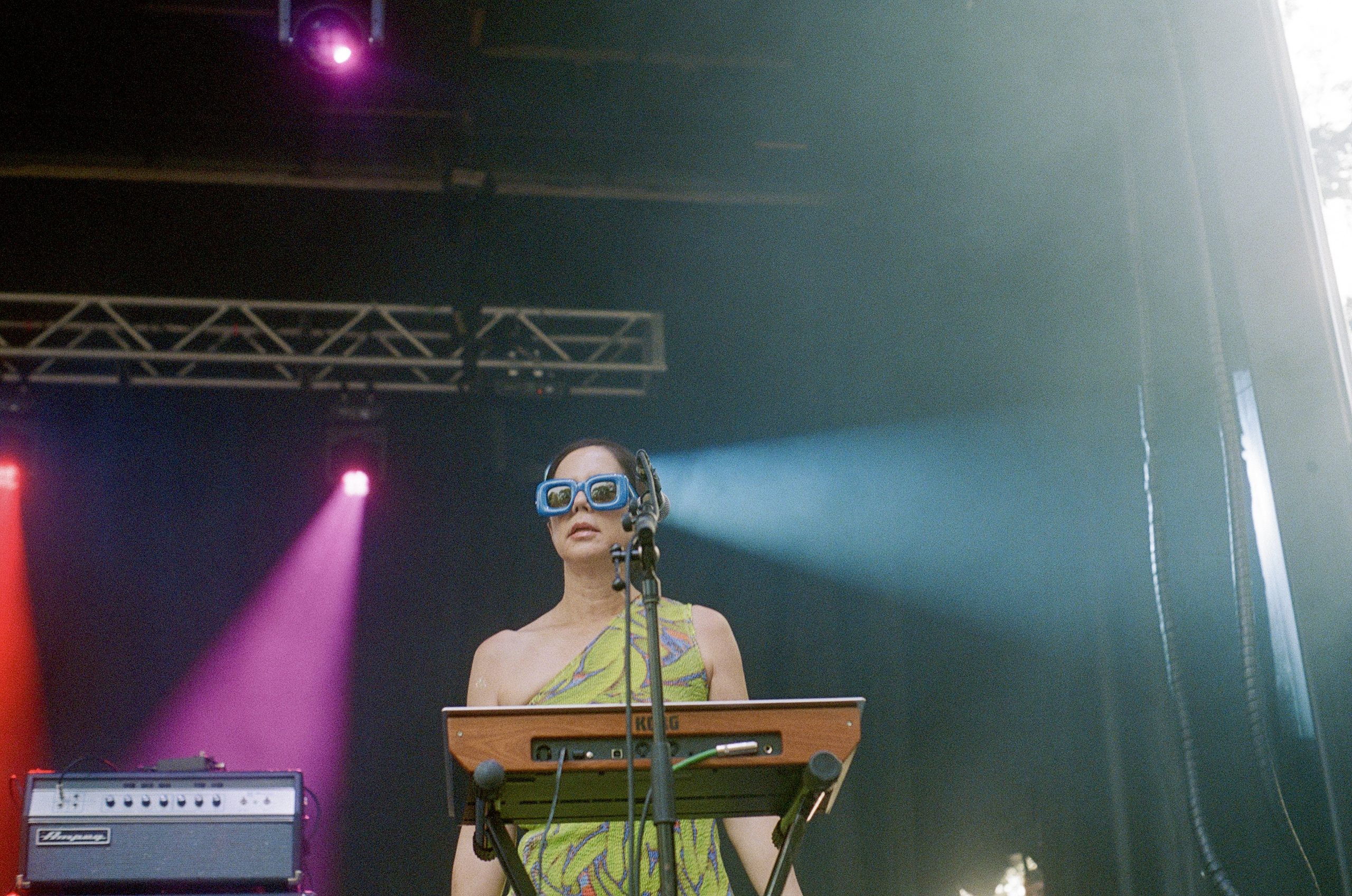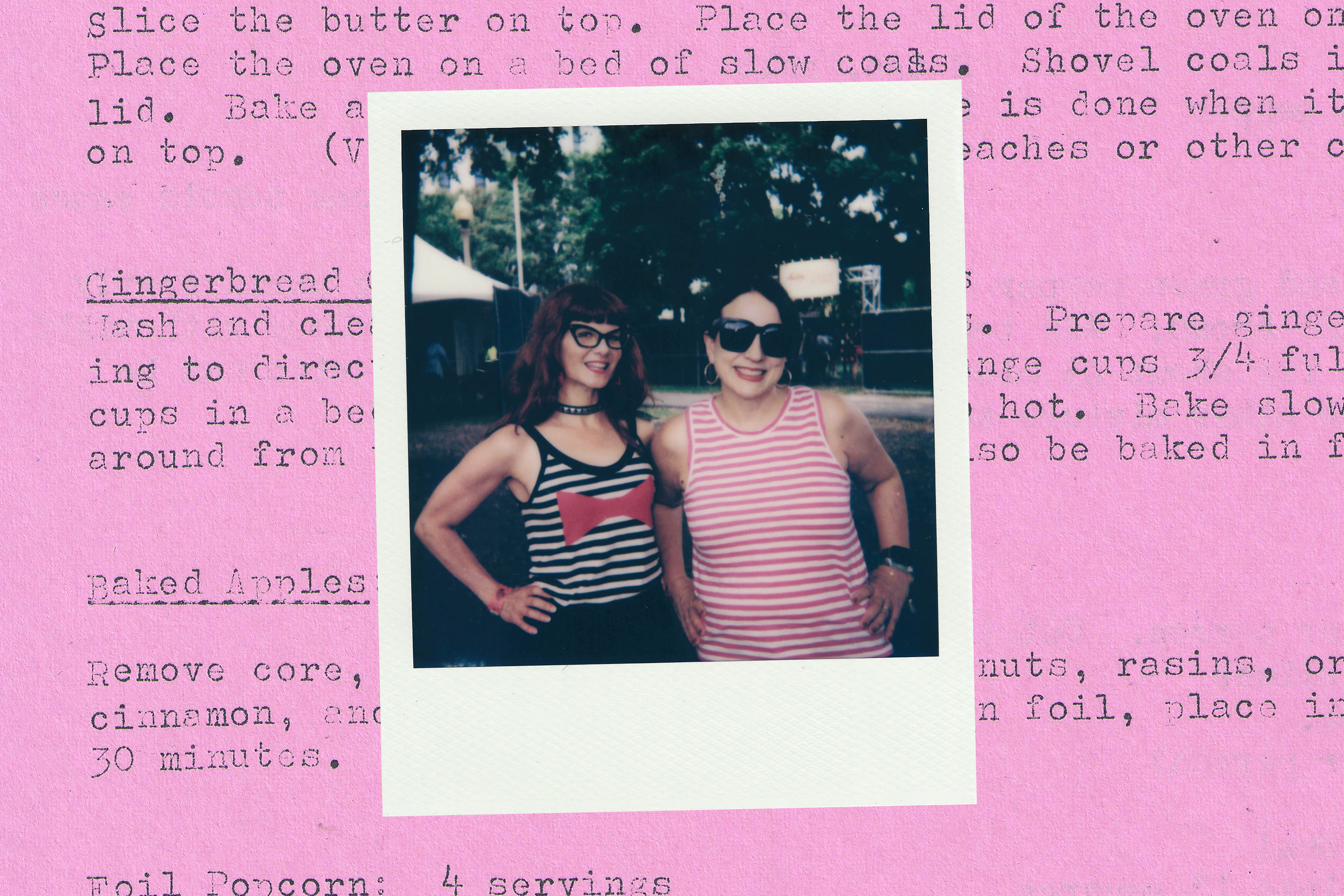Bratmobile is the recently reunited project of musicians Molly Neuman and Allison Wolfe which originally began in Olympia, Washington alongside guitarist Erin Smith. The band was one of the first acts to pioneer the feminist punk rock movement later dubbed “Riot Grrrl,” after the zine penned by Neuman. Now, thirty-three years since their inception, Bratmobile’s live act has grown to include Rose Melberg (Tiger Trap, The Softies), Audrey Marrs (Mocket), and Marty Key (Ted Leo & the Pharmacists). For the first time since 2002, Bratmobile took the stage in Chicago to play at Pitchfork Music Festival where we caught up with them about their decision to return to the band, zines, ‘Pottymouth,’ and staying mobile.
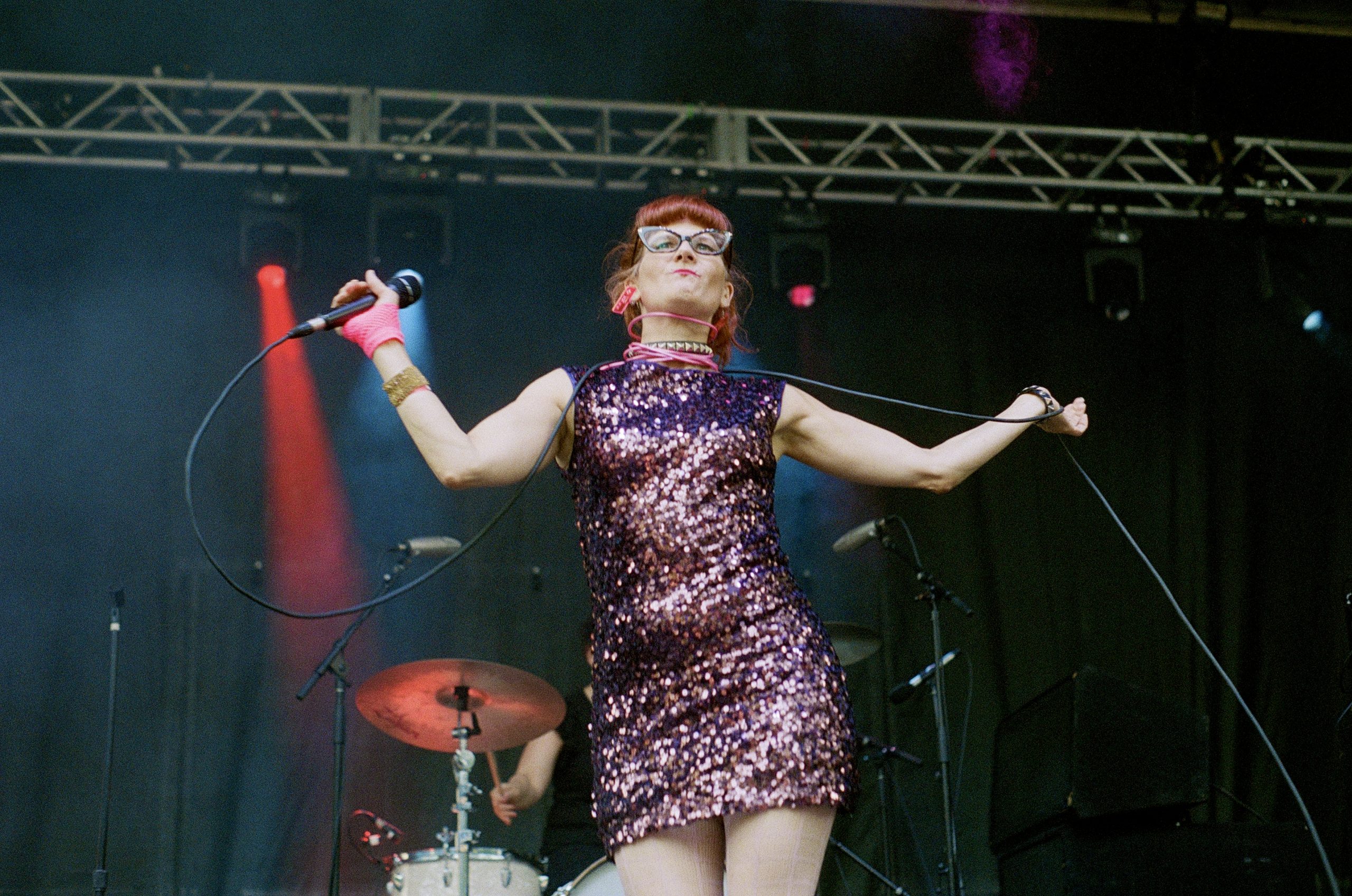
Note: This interview has been edited and condensed for clarity.
What’s your name and what do you do in Bratmobile?
Molly Neuman: I’m Molly, and I play drums in Bratmobile.
Allison Wolfe: I’m Allison and I sing in Bratmobile.
The past few years have seen the world in a very turbulent state, as I’m sure you know well, and a lot of the issues that were being fought for 30 years ago now have to be fought for all over again. All these bands like Le Tigre, Bikini Kill, and now Bratmobile, are coming back, and I’m wondering, why do you think that it’s important for Bratmobile to be back now? And what were the conversations like around the decision to come back?
A: Molly and I were at an L7 concert before we got back together and we were just thinking how cool it was that they’re back doing things and how much it’s just important for women and non-binary people of all ages to continue to create their own culture, and to create the culture and society that you want to see. You have to be the change that you want to see, and you don’t just stop at a certain age. I think it was important for us to show that women at our age, as they’re aging– well, I’m 29 again, but anyways– that we can just keep doing stuff. You don’t get put out to pasture just because society says so.
M: When we first started our band, we were teenagers, basically, right? Or, on the cusp of “un-teenagering.” Claiming space to have youth in music is part of what we were doing then, too. So, now that we are beyond teenage years, and we have different phases of life that we are in, it does feel important, along with some of the cultural challenges that we’re all having and rights literally taken away that we were fighting for protecting thirty plus years ago, to have space again for ourselves at this point in our lives. And we’re still moving, we’re mobile… no pun intended. I never thought about that. Bratmobile is…
Mobile!
M: Yeah! And for thirty more years, who knows? But yeah, that we still have the ability and support– it’s amazing to know that we can connect again with new generations. It’s something that you just don’t really take for granted in life.
I’ve been reading Kathleen Hanna’s new memoir, and I find it really interesting how she describes finding her love for singing and then also her journey of discovering that women could also be in bands and perform. What were both of your journeys like when you were discovering that you loved playing the drums and singing? When did you realize that you could also be in a band and perform?
M: I think it all happened around the same time. We were going to shows– Allison’s from Olympia so a lot of bands that we were inspired by when we were starting were from her town, so she knew them as people–
A: And we saw them perform in very non-traditional ways. People would just have a little salon at someone’s apartment and do songs where they just sang acapella. So, we started doing that at first, because we were inspired by all of those Olympia, K Records-type bands and performers at the time. We needed something super D.I.Y. and non-traditional, I think, to make us feel like eventually we could do it too.
M: Yeah, yeah! And the people that were in those bands and on those tapes that we were listening to were people like Tobi Vail, who were also making fanzines and writing about feminism and space for girls in music and punk. So, all of those things were ideas that were connecting while we were learning guitar and learning how to play drums and starting to write songs ourselves. So, that was kind of fortunate. It was not just the music that was inspiring us, but the ideas that were shared in forms that were also really accessible– like zines, that we could trade and write for each other. I don’t know if [Allison] remembers this story, but, I wrote away for some of the fanzines, but I sent a check for $1.50, and Donna from Team Dresch, who had a fanzine called Chainsaw that became a label and sort of her own industry, if you will, for queer youth in the 90s, sent it back to me. She was like, “thanks for your check of $1.50, but I literally can’t cash this.” [laughs] So, she sent it for free.
A: Yeah, I think grunge was also really huge in the Northwest by then, even before it technically “broke.” I think that, while we liked a lot of those bands, we just felt like there was a lot of sexism going on in that too– just with long hair and flannel– and we had something to say and that even if we didn’t quite know yet how to express it, that we would figure out how.
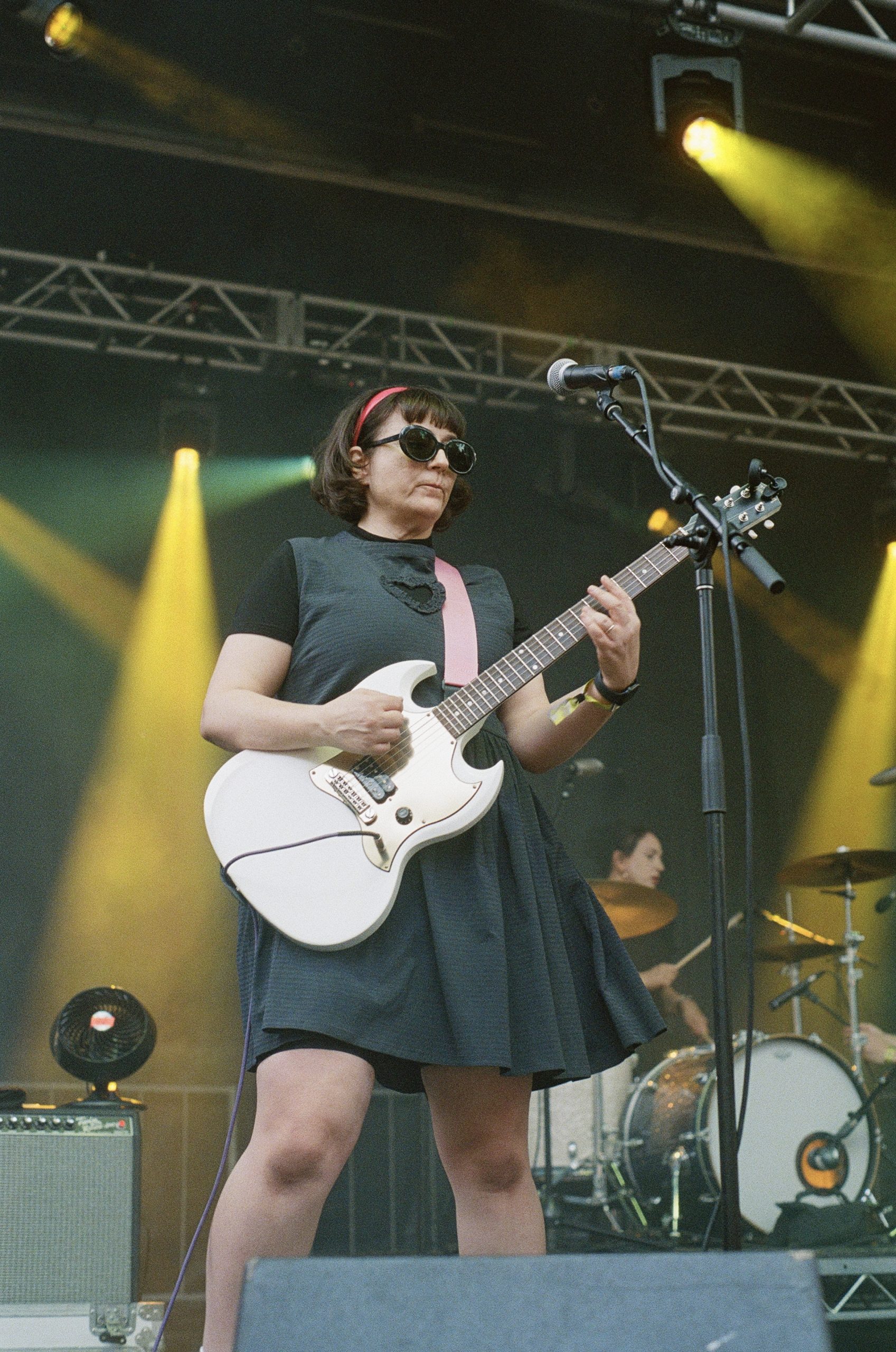
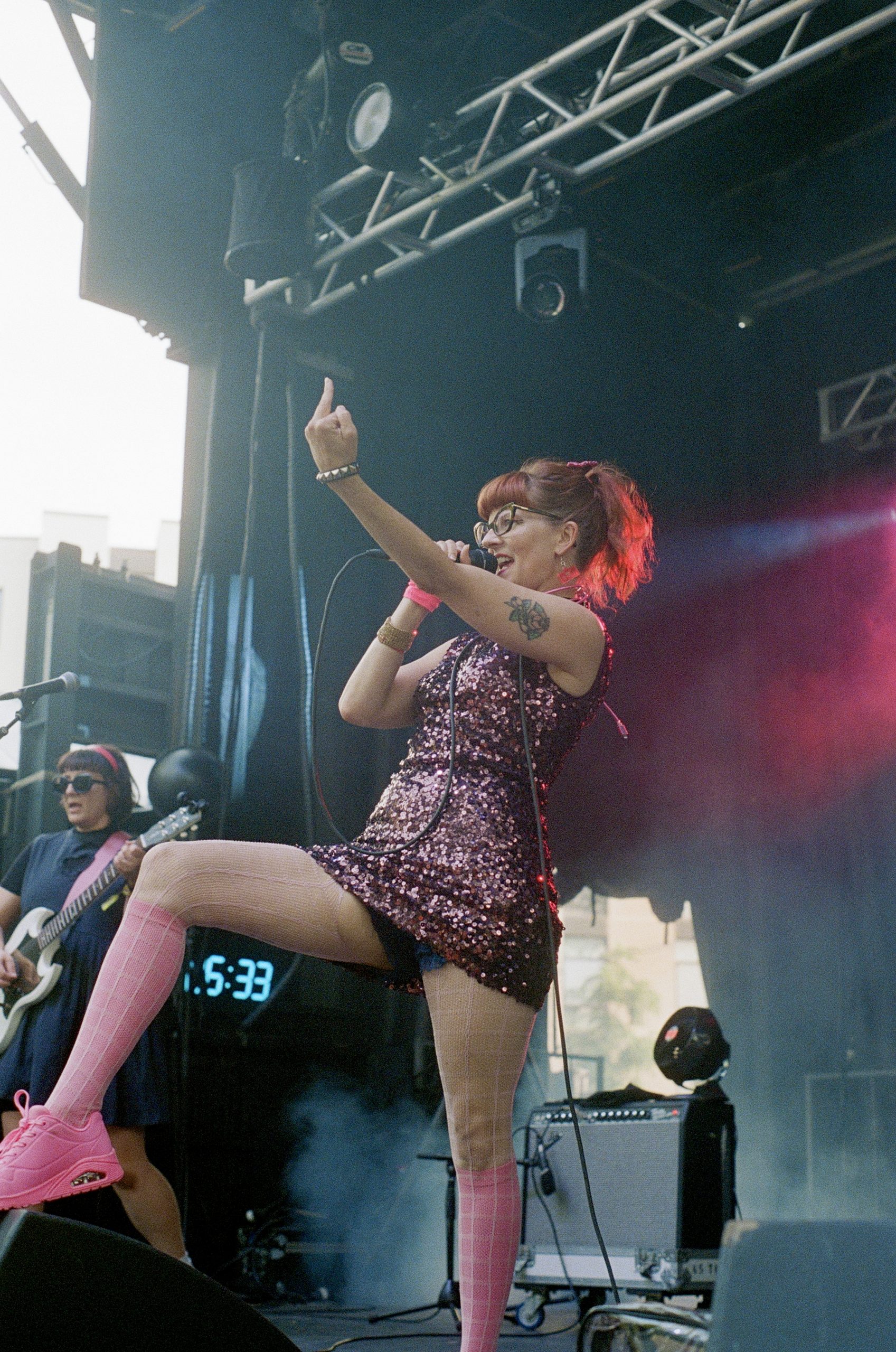
That leads me to– obviously listening to your music, you can hear that it is lo-fi and raw, but also very clean at the same time. Listening to it made me realize that I could make something that sounded like this too. Was that your intention to make the songs–especially on ‘Pottymouth’– to feel accessible to young women and young people? Could you tell me more about the creation of that record specifically?
M: Well, I mean, I think part of it is we didn’t have any money and we didn’t really have a label at that point. You know, Kill Rock Stars was just starting. That album is the first LP on Kill Rock Stars ever. There were singles! But that was the first album. We had a friend, Tim Green, who was in a band at that time called Nation of Ulysses, who had a four track reel-to-reel set up in their basement. We had been practicing there and writing songs there and so, we just asked him to record and we literally had no money, so, that’s why it sounds that way. I think we’re fortunate that he’s so skilled that he knew how to use those tools to make something sound great even though you know, there’s only four tracks to work with.
A: It was in his basement and we paid him like, a box of hair dye and a pizza or something–and we had to pay for the tape which was probably forty bucks. The thing is, when we started our band, we didn’t really know how to play. We taught ourselves, you know? And so that’s probably why it sounded accessible for a while. I mean, Molly is probably the most amazing drummer I know–her and Tobi Vail–but I mean, she taught herself that by intently watching other drummers and being really passionate about it. I’m still kind of DIY-ing the vocal stuff but, whatever! It’s fun! But it is funny when so many people do say you made me feel like I could do it too–yeah I bet!
I know you’re both veterans of zine making, and I was wondering if you had any advice for young people–especially young women, young non binary people, young queer people– who want to start making zines themselves?
M: I mean, young people should know how to send packages in the mail, right? I mean, I’m not trying to sound condescending, but having a young child myself, one of the things we try to put in practice is writing a letter and putting a stamp on an envelope.
A: It’s hard!
M: People just don’t do it anymore. It’s not like, you know, sending mail and writing letters– I noticed you have very nice handwriting by the way– that’s not something you take for granted anymore, honestly, because our fingers, our hands have to work differently in so many ways–whether it’s pounding a tablet or typing. So, I mean, I’m being a little bit ridiculous, but also I do think it’s part of what zine’s meant to us and part of why I think it’s an important part of our history. In fact, on Tuesday I’m going to go to the National American History Museum which has one of our zines in an exhibit right now.
A: I never thought that would happen.
M: Right! It’s bananas! But I think we built a lot of our culture, even though some of our best friends and comrades lived one town over, there was something about writing a letter, having an intention, and having a message that we wanted to put in the fanzine and also the process of sending it, helped build a lot of our relationships. And so, I think that’s one thing I would hope some of the younger generations of people making music and sharing ideas [are still doing]. You have a whole different universe of connection that makes a lot of things better and easier, but some of the depth might not be there I think, that is, when you reflect back on what we were able to do by putting out a fanzine and making copies of it and sending it in the mail to our friends and getting theirs back in exchange. Some of the things are embarrassing all these years later, it’s fine, but you know, I think it really did have us have to build that relationship.
A: Well also, I mean, yeah, it was a form of expression and it was part of the whole DIY, and Riot Grrrl definitely took on the tenets of DIY and taking over the means of production to represent yourself. And if it’s like a photocopier and, you know, glue and tape and scissors– okay great! Back then too it was pre-digital, so it was also a way of networking with each other. And you could kind of send this stuff across the country to each other–and it’s kind of amazing how much we actually did network pre digital, you know, pre internet and everything.
M: Oh, totally!
A: It’s wild how many connections we made. It was also an informal economy too. Like you’d trade your zine for someone else’s record and blah blah blah.
M: I mean our band was– Allison and I had the idea for our fanzine slash radio show that we wanted to have before we actually called ourselves Bratmobile and then when we had that fanzine and I met Erin maybe six months later and we were in the final stages of printing it and that was how–she already had a fanzine and that was probably our first conversation. Whoever introduced us was like “oh, she’s got a zine, you’ve got a zine!” That was how we actually built our friendship, with Allison, Erin, and me. When we first played together, because we didn’t live in the same city, that was the root of it.
